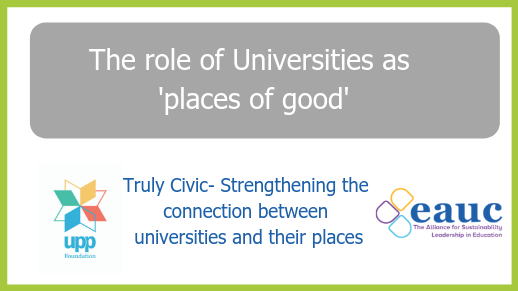The Civic University Agreement has already seen much support which is unsurprising as EAUC's members have long been proponents of the tenets in the Agreement.
The UPP Foundation Civic University Commission have released a new report this week, highlighting the role of universities as 'places of good'. The report makes some key recommendations, including a 'Civic University Agreement' - which 30 institutions committed to sustainability and its pillars have signed up to.
In the reports foreword, Lord Kerslake, Chair of the UPP Foundation Civic University Commission and former Head of the Civil Service, outlines the civic role universities have:
"How important is the civic role of universities? Given the not inconsiderable issues that universities are currently facing – student loans, funding, Brexit – this is a reasonable question to ask. The UPP Foundation Civic University Commission, which it has been my honour to chair, has concluded that it is vital to securing a successful future for our cities, towns and communities.
Universities play a key role nationally through their teaching and research work. But they are also hugely important to the economic, social, cultural and environmental wellbeing of the places in which they are located."
The four big recommendations in the report 'Truly Civic: Strengthening the connection between universities and their places' are:
- Civic Universities should enshrine their analysis and strategy in a Civic University Agreement that is co-created and signed by other key civic partners.
- There should be a three-part approach to measuring – and therefore incentivising – the success of the civic university.
- A new fund should be created that allows universities to bid for resources that will allow them to implement their strategies.
- A Network for the Civic University should be established.
The CEO of EAUC, Iain Patton pointed out:
“EAUC, and the sustainability community we represent, welcome this report. Being a Civic University is not just about being a good neighbour or encouraging more student volunteering. It is the recognition of the total economic, social and environmental value (both positive and negative), universities and college bring to society. But our Members know that institutional business models and practices are ill-equipped to embrace the growing expectations of students, employers, neighbours and other society stakeholders. Failure to recognise and quantify social and environmental impacts has left them stranded outside traditional decision-making and reporting processes.
It is for this reason EAUC and AUDE recently launched the Sustainability Leadership Scorecard which helps leaders think and function in an integrated and systemic way. We encourage Civic University Agreement signatories not already using the Scorecard to collaborate with their sustainability teams and use this powerful tool to ensure their university or college are indeed places of both civic and planetary good.”
The Civic University Agreement principles are:
- As place-based institutions we are committed to attaching a high-priority to the economic, social, environmental, and cultural life of our local communities.
- Our civic role will be informed by an evidence-based analysis of the needs of our place, developed collaboratively with local partners and informed by the voice of our local community.
- We will collaborate with other universities and anchor institutions and form partnerships to overcome the challenges facing our local communities.
- With our partners, we will be clear about what we do and how we measure it, so we can say with confidence what we have achieved – and how we might do better in the future.
- As Universities, we are responsible to our students and our staff, but we are also responsible to the places around us. Our Civic University Agreements will be an opportunity to set out clearly, coherent and creatively how we will fulfill that responsibility.
Professor Colin Bailey, President and Principal, Queen Mary University of London
Professor Liz Barnes, Vice-Chancellor and Chief Executive, Staffordshire University
Sir David Bell, Vice-Chancellor and Chief Executive, University of Sunderland
Professor Dame Janet Beer, Vice-Chancellor, University of Liverpool
Professor Paul Boyle CBE, President and Vice-Chancellor, University of Leicester
Professor Stuart Croft, Vice-Chancellor and President, University of Warwick
Professor Chris Day, Vice-Chancellor and President, Newcastle University
Professor Sir David Eastwood, Vice-Chancellor, University of Birmingham
Professor Graham Galbraith, Vice-Chancellor, University of Portsmouth
Professor David M A Green CBE, Vice-Chancellor and Chief Executive, University of Worcester
Professor Sir Chris Husbands, Vice-Chancellor, Sheffield Hallam University
Professor Koen Lamberts, President and Vice-Chancellor, University of Sheffield
Professor John Latham, Vice-Chancellor, Coventry University
Professor Geoff Layer, Vice-Chancellor, University of Wolverhampton
Professor Susan Lea, Vice-Chancellor, University of Hull
Patrick Loughrey, Warden, Goldsmiths, University of London
Professor Helen Marshall, Vice-Chancellor, University of Salford
Professor Quintin McKellar CBE, Vice-Chancellor, University of Hertfordshire
Professor Trevor McMillan, Vice-Chancellor, Keele University
Professor Kathryn Mitchell, Vice-Chancellor and Chief Executive, University of Derby
Professor Sir Anton Muscatelli, Principal and Vice-Chancellor, University of Glasgow
Professor Paddy Nixon, Vice-Chancellor and President, Ulster University
Professor Nick Petford, Vice-Chancellor, University of Northampton
Professor Judith Petts CBE, Vice-Chancellor, University of Plymouth
Professor Colin Riordan, President and Vice-Chancellor, Cardiff University
Professor Mark E. Smith, Vice-Chancellor, Lancaster University
Professor Mary Stuart, Vice-Chancellor, University of Lincoln
Professor Adam Tickell, Vice-Chancellor, University of Sussex
Professor Saul Tendler, Acting Vice-Chancellor and President, University of York
Professor Shearer West, Vice-Chancellor and President, University of Nottingham
Professor Steven West CBE, Vice-Chancellor, President and Chief Executive Officer,
University of the West of England
More information can be found here.
ENDS











